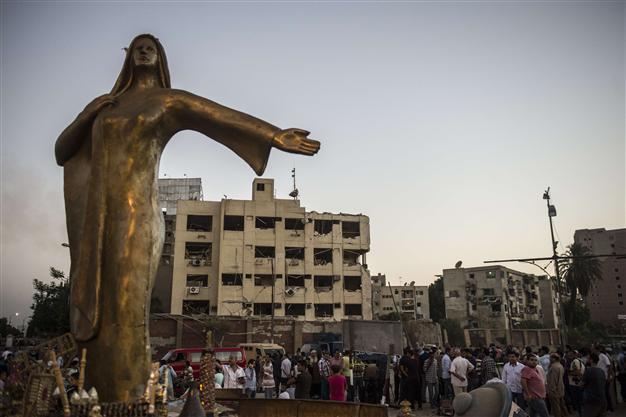Car bomb wounds six Egyptian policemen in Cairo
CAIRO - Agence France-Presse

Members of the media and Egyptians stand in front of the damaged national security building in northern Cairo's district of Shubra on August 20, 2015. AFP Photo
A car bomb wounded six Egyptian policemen on Aug. 20 as it exploded in front of a police building in Cairo, the interior ministry said, the latest in a wave of militant attacks that has rocked Egypt.The powerful blast in northern Cairo's district of Shubra came in the middle of the night, an AFP journalist said, as Egyptian security forces are being targeted by Islamic State of Iraq and the Levant (ISIL) jihadists waging an Islamist insurgency.
"A man suddenly stopped his car in front of the state security building, jumped out of it and fled on a motorbike that followed the car," the ministry statement said.
"The car exploded wounding six policemen."
The blast made a wide crater near the four-storey building, shattered its windows and destroyed a major part of the front portion of a surrounding wall, an AFP correspondent reported from the site.
One of the two guard posts at the entrance of the building was also destroyed.
A vehicle engine lay metres away from the entrance as police cordoned off the site to prevent crowds of people from gathering, and broken metal parts of a car lay scattered on the ground.
Front glass windows of three buildings near the site were also shattered.
"The front glass window of my apartment broke and two doors fell down. It was like an earthquake," Hady Gad, a resident living behind the building told AFP.
The bombing came just days after President Abdel Fattah al-Sisi ratified an anti-terrorism law which critics claim gives wider powers to police, restricts human rights and muzzles the press.
No one has yet claimed responsibility for the Aug. 20 attack, but the "Sinai Province", the Egyptian branch of ISIL, regularly carries out attacks on security services as part of an insurgency that has swelled since the army's ouster of president Mohamed Morsi in July 2013.
Jihadists say their attacks are in retaliation for a police crackdown targeting Morsi supporters that has left hundreds dead and thousands jailed.
Hundreds more have been sentenced to death after speedy trials, denounced by the United Nations as "unprecedented" in recent history.
The Aug. 20 blast comes weeks after ISIL claimed a car bomb attack targeting the Italian consulate in downtown Cairo on July 11, which left a passer-by dead.
That attack was the first such targeting a foreign mission in Egypt since the jihadists began their campaign against security forces two years ago.
The consulate bombing was followed by the abduction and apparent beheading of Croatian engineer Tomislav Salopek, which the Sinai Province group claimed on August 13.
Experts said the group appeared to have changed its strategy in its fight against the Egyptian authorities.
After launching spectacular attacks targeting security forces in its bastion in North Sinai in the past two years, the group is now adopting tactics similar to the main ISIL group in Iraq and Syria -- abducting and beheading foreigners.
Salopek's abduction appeared aimed at threatening tourists and foreign employees of Western firms -- two cornerstones of an economy battered by years of political unrest since the 2011 uprising that ousted then-president Hosni Mubarak.
Faced with the deadly jihadist insurgency, Sisi ratified on Aug. 16 an anti-terrorism law boosting police and judicial powers. It also imposes hefty fines for "false" media reports on militant attacks.
Rights groups, which have accused Sisi of imposing a repressive regime, fear the new law could be used to further muzzle dissent and target critics.
The passing of the law was expedited after state prosecutor Hisham Barakat was assassinated in a car bombing in June, followed by a large-scale jihadist attack in the Sinai Peninsula days later.
The judiciary and security forces already had wide-ranging powers in tackling "terrorism", and Sisi's regime has been accused of using the battle against jihadists as a pretext for crushing dissent.
The law "increases authorities' power to impose heavy sentences, including the death penalty, for crimes under a definition of terrorism that is so broadly worded it could encompass civil disobedience," Human Rights Watch said on Aug. 19.
But the foreign ministry hit back at these criticisms, insisting that other countries should "respect the independence of the (Egyptian) judiciary".
















